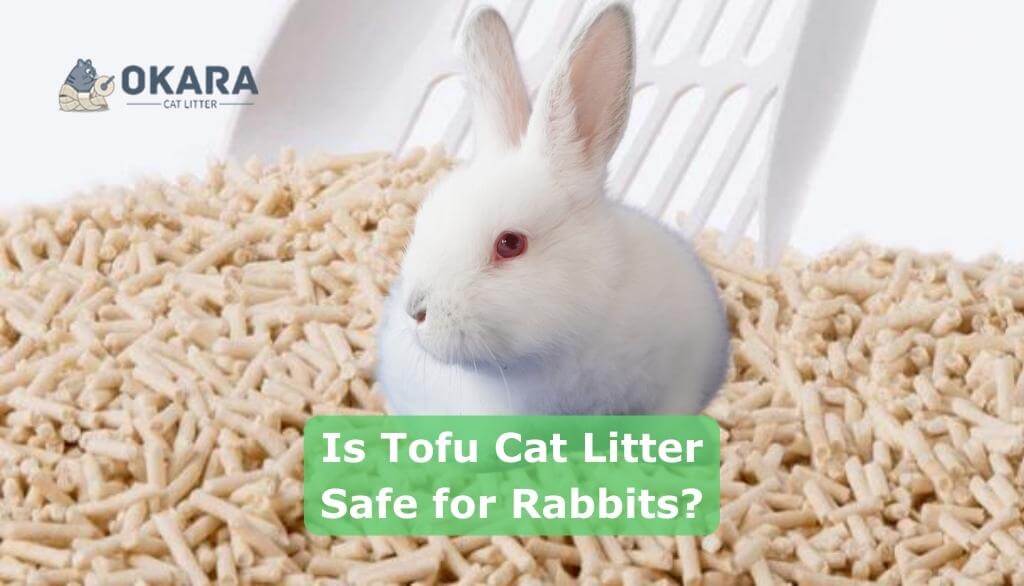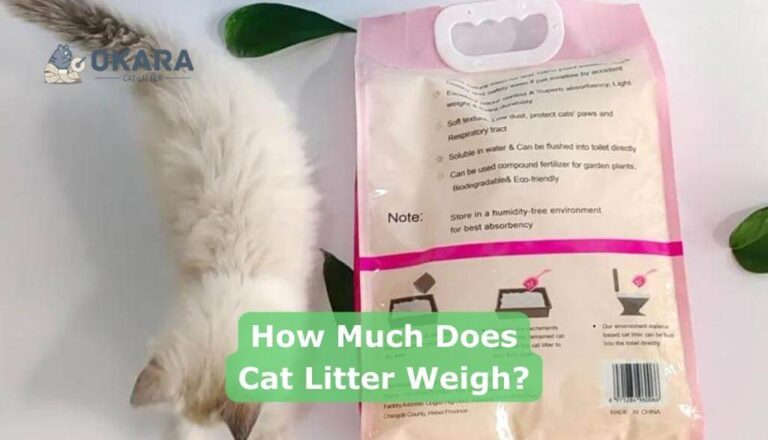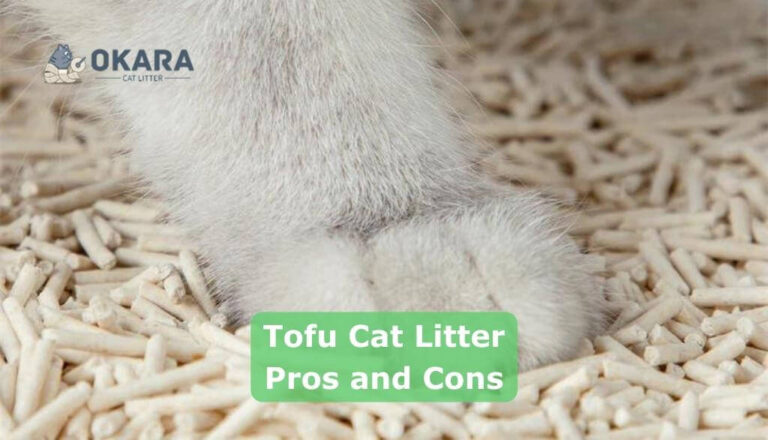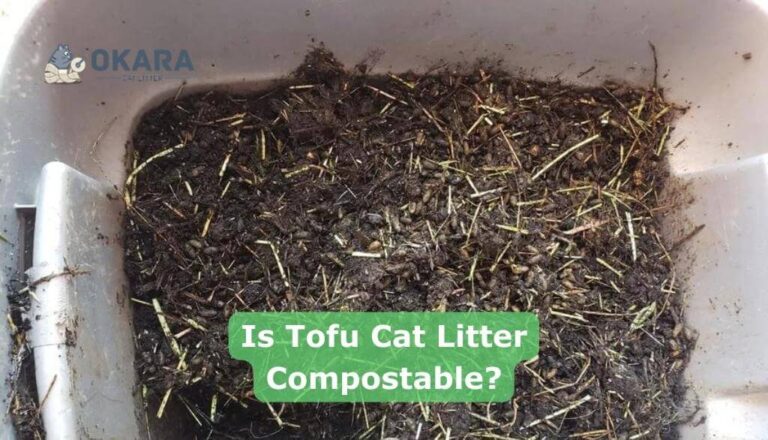Is Tofu Cat Litter Safe for Rabbits?
Is tofu cat litter a viable and eco-friendly choice for litter training pet rabbits? While clay, paper, and pelleted litters are most commonly used, some rabbit owners are exploring plant-based and all-natural options, including tofu litter.

Table of Contents
Is Tofu Cat Litter Safe for Rabbits?
Tofu litter is made from byproducts of tofu production and is marketed as an environmentally-friendly, renewable resource alternative to mined materials. One key consideration when exploring tofu litter for pet rabbits is the safety and healthiness of the materials. Tofu litter is made from byproducts of tofu production, while traditional rabbit litters use clay, paper, or wood shavings.
Tofu litter ingredients are plant-based and non-toxic in theory, but not necessarily food-grade or specifically meant as bedding for livestock.
Regular unscented clumping cat litters tend to be a more suitable choice, as long as they avoid fragrances, dyes, gum-based or clumping agents not meant for ingestion. Some litters are marketed as bedding for small animals and herbivores.
When choosing a tofu litter, read labels carefully or look for litters explicitly meant and tested for use with small pets.
Improperly selected tofu litter does pose some risks to rabbits’ health and well-being. Cat litters are designed for cats’ needs, not rabbits.
Ingredients meant as clumping agents for felines could be eaten and cause digestive issues if consumed by rabbits. Fragrances or dyes may also be an irritant. Rabbits with respiratory issues need to avoid ultra-fine, dusty particles more often found in cat litters. Proper pellet size and dust content are important for any rabbit, but especially those already prone to respiratory problems.
Potential health risks of tofu litter include:
- Ingestion of non-food grade additives: Clumping agents, dyes, fragrances or other additives could cause digestive issues if eaten in large amounts, even if labeled “non-toxic”. Only food-grade ingredients properly meant for ingestion by livestock should be used.
- Irritation and respiratory problems: The fine, dusty particles in some tofu litters could irritate sensitive ears, eyes, throat and lungs, especially in rabbits with prior respiratory disease. Proper pellet size and dust content for livestock is important.
- Foodborne illness: Contaminated, unsanitary materials could lead to illness from bacteria, pathogens or other microbes even if generally plant-based and non-toxic. Food-grade, composted manure or wood shavings are tested to ensure safety. Tofu litter is not.
- Ammonia burn: Lack of odor/waste control could expose rabbits to high ammonia, causing burning of eyes, nose and throat. Tofu litter may require more maintenance to keep such toxins at a minimum, and some rabbits could not tolerate it, even then.
- Allergic reaction: Some rabbits could potentially have an allergy or sensitivity to tofu, soy or other ingredients in the litter. Always do a patch test first, even with “hypoallergenic” and “non-toxic” claims.
When used properly with a high-quality, rabbit-safe tofu litter and monitored closely, the health risks can be minimized. But cat litters are not regulated or tested the same as litters specifically meant as bedding for small livestock. With research, the safe option is possible but may require more effort to ensure.
Absorbency
Tofu litter is made of plant materials and tends to absorb urine adequately for most rabbits when used properly in an appropriately sized litter box. However, the absorption may not be as high as clumping clay or pelleted wood liter, especially for larger or male rabbits. Tofu litter can compact under weight and may require more frequent changes to keep absorption high enough.
Pros
- Made of renewable, eco-friendly plant materials. Hypoallergenic and dust-free options available.
- Generally absorbs urine suitably, especially for smaller rabbits or when litter depth is properly maintained.
Cons
- May not absorb as much as mineral (clay) or wood (pellet) litters, especially over time or for high-output rabbits. More frequent changes could be needed.
- Easily compacted, potentially leading to less absorption and more mess. Deeper litter or larger litter box size may help but not fully remedy.
Odor Control
Tofu litter can help control odors to some extent, but often not as thoroughly as litters specifically designed for odor prevention, especially in high-humidity enclosures. Bacteria growth and ammonia buildup may occur faster in tofu litter due to lack of odor controlling agents. Frequent changes and cleanings are usually needed to keep smells at bay.
Pros
- Plant-based, natural and compostable materials. Eco-friendly option.
- Can help reduce odors, especially with consistent maintenance.
Cons
- Typically does not control odors as well as clay, silica or wood liter options, especially over longer periods before changes/cleanings. Ammonia and other smells may develop faster.
- Requires more diligent and frequent changes/maintenance to prevent excess odors due to lack of strong odor preventing agents. Messier and higher-maintenance process.
- Fast bacteria and mold growth possible in damp, odor-trapping environment. Chemical odor destroyers not present to prevent this like in other litters.
Clumping Tofu Litter
Pros
- Typically better at absorbing and containing odors since the clumps help trap waste and ammonia within the litter. May require less frequent changes for odor prevention.
- Can form a firmer, more solid surface for the rabbit to dig in, which some owners report rabbits preferring.
Cons
- Clumping can make the litter harder to dig through, which some rabbits dislike. Non-clumping may be easier for rabbits to root around in.
- Clumps can be more difficult to remove during spot cleanings or complete changes. May require raking/sifting to break up clumps, which is extra work.
- There is a possibility of clumps forming in the corners/edges of the litter box or even under the litter, which is hard to fully clean.
Non-Clumping Tofu Litter
Pros
- Usually easier for rabbits to dig through and move around in. Allows for more natural digging behavior.
- Typically easier to remove clumps during spot cleanings or perform complete changes. Can simply scoop out waste and soiled litter.
- Less likely to form clumps in hard to reach areas that lead to poor hygiene. Easier to keep litter box deeply cleaned.
- Some rabbits seem to prefer the looser, fluffier surface. Allows for easier burrowing and nest-building.
Cons
- Usually less effective at absorbing and containing odors since there are no clumps to help trap waste and ammonia. May require more frequent changes, especially over time.
- The looser litter can be messier outside the litter box, as more stray pieces end up on surrounding surfaces. Requires diligent cleaning up of stray litter.
- There is a possibility the litter could shift and settle unevenly in the box over time,developing low and high spots that are difficult to level, even with frequent stirring.
There are good options and trade-offs to weigh with either clumping or non-clumping tofu litter for pet rabbits based on your rabbits’ preferences and priorities regarding waste management, odor control and ease of maintenance. For maximum odor and mess control with easier digging, a clumping litter may have some benefits. For easier maintenance and more natural digging, non-clumping could prove preferable.
As with any litter, consistency and diligence in use are key to keeping things hygienic, no matter the clumping style. With some experimentation, you can determine which version, if any, of tofu litter works best for your unique rabbits and situation.
Rabbits’ Preferences for Litter
Rabbits’ preferences for litter texture and feel can vary greatly between individuals. Some general tendencies to be aware of when choosing a litter type include:
- Many rabbits prefer softer, dust-free and fluffier litters that provide cushioning and allow for digging. Options like aspen shavings, paper pellets or some cellulose fibers tend to appeal to rabbits enjoying nest-building and digging. Tofu litter and some non-clumping plant-based litters could work well for these preferences.
- Other rabbits prefer harder, clumping litters that provide more solid footing. Clay, silica crystal and clumping wood litters are good options for rabbits that prefer a firmer surface to walk on or like to perch on the edge of the litter box. Clumping tofu litter variations may also suit these preferences, if the clumps are not too large.
- Some rabbits are messy ” flickers”, frequently kicking litter out of the box, while others are neater. Fluffy, dust-free litters tend to be less messy outside the box for flickers, while clumping litters can also help contain waste better. The litter type and depth needs to suit the rabbit’s particular flicking/messiness tendency to minimize stray litter.
- Texture preference can even change over a rabbit’s lifetime based on health, age or other factors. What a younger rabbit prefers may differ from an older rabbit’s needs or tastes.
In terms of how rabbits tend to receive and react to tofu litter based on reports from owners and what we know about rabbit litter preferences in general:
- Some rabbits seem to genuinely prefer the soft, silky feel of tofu litter for digging and nest-building. It provides a very different texture experience than wood or paper litters.
- Other rabbits flick or dig tofu litter out at a higher rate, seeming to dislike the texture. It may not feel solid or gritty enough under their feet.
- The clumping style of tofu litter can deter “flickers” since clumps stick together better, but the large clumps still don’t provide a completely solid surface and tend to get flung out of the box more easily.
- Rabbits with respiratory issues or fine fur tend to dislike the dustiness of some tofu litter options, finding it irritates their sensitive areas. Non-clumping, dust-reduced styles are better in these cases.
- Tofu litter may be more attractive due to natural image and smell, but the texture is the most important factor in whether a rabbit prefers or rejects the litter. Its eco-friendliness will not make up for an uncomfortable texture.
While some rabbits do genuinely prefer the unique soft and silky feel of tofu litter for digging or nesting, many others tend to flick or displace it due to disliking the texture. Tofu litter can work, but a rabbit’s litter box preference needs to be the priority when choosing. Do tests with small amounts, monitor how your rabbit responds, and be ready to switch to a different litter type if tofu is not well-received.
Tofu Litter: Better for the Environment
For eco-conscious rabbit owners and those concerned about environment impact, the sustainability and “greenness” of tofu litter is appealing as an alternative to petroleum-based rabbit litters.
- Made from renewable plant materials rather than non-renewable petroleum. Tofu litter is a byproduct of tofu production, so it’s a sustainable resource.
- Biodegradable and compostable. Tofu litter will safely break down in landfills or compost rather than persisting for thousands of years like some petroleum products.
- Lower carbon footprint. Plant-based materials and less processing/transportation generally mean a smaller carbon footprint than litter made from petroleum or wood/clay minerals.
- Hypoallergenic and dust-free options available. Better for indoor air quality and respiratory health versus dusty litters.
While tofu litter is touted as an environmentally-friendly, sustainable alternative to petroleum-based litters for rabbits, it is an oversimplification. There are good reasons tailored small animal litters exist as the standard. Other plant-based and wood litters may actually have a smaller environmental footprint and be better suited for the specific needs of rabbits. And proper use/disposal is crucial to any litter’s eco-benefits.
Tofu litter could work and have merits as a sustainable choice for some, but it is not automatically the “greenest” or most eco-friendly option. Do comprehensive research comparing different products based on resources, processing, testing standards, lifespan and disposal impacts. Consider your rabbits’ unique needs to ensure any litter will work well and prevent extra waste. And commit to responsible use/disposal of any litter to maximize environmental benefits.
Price and Availability
When it comes to choosing the best litter for your pet rabbit, there are many options available in the market, including traditional paper or wood-based litters, and even tofu-based litter. The price and availability of these different types of litter can play a significant role in determining which option is best for you and your furry friend.
Tofu-based litter, also known as soy-based litter, is a relatively new product in the pet litter market. As a result, it may not be as widely available in pet stores as traditional litter options. However, it can often be found online through various retailers and e-commerce platforms.
In terms of price, tofu-based litter is typically more expensive than traditional paper or wood-based litters. The cost of tofu-based litter can vary depending on the brand, size, and quantity of the product. On average, a bag of tofu-based litter can cost anywhere from $10 to $20, while traditional litter options can cost as little as $5 to $10 per bag.
However, it is essential to consider the long-term benefits of using tofu-based litter. Tofu-based litter is biodegradable and made from renewable resources, making it an eco-friendly option for those who are environmentally conscious. Additionally, tofu-based litter has excellent odor control properties and is relatively dust-free, making it a healthier option for both pets and humans.
While the higher price and limited availability of tofu-based litter may deter some pet owners from trying it, the long-term benefits and advantages of this type of litter may be worth the investment. With proper research and consideration, pet owners can make an informed decision about which type of litter is best for their furry friend and their budget.
Rabbit Litter Options
FAQs
Can I Use Tofu Litter for Rabbits?
Using tofu litter for rabbits can work, but it does require some consideration of your rabbits’ needs and preferences as well as the characteristics of the tofu litter. It is important to only use natural biodegradable litters as your rabbit may chew or eat small amounts. Crystal and clay litters should not be used.
What Cat Litter Is Safe for Rabbits?
Regular unscented clumping cat litter with natural, plant-based ingredients can be safe for rabbits in limited amounts, but for long-term use, litters specifically meant as bedding for small animals are a better choice.
Rabbit-safe litters are designed, tested and labeled to ensure they are low-dust, non-toxic, chemical-free and appropriate for use with herbivores.
What Is the Best Litter for Pet Rabbits?
We recommend using CareFresh (a rabbit-safe pet bedding that does not contain any pine or cedar products) and fresh hay to prepare your bunny’s litter box. Spread one inch of clean CareFresh covering the bottom of the pan, then add a big handful of hay. Remember to use rabbit-safe litters in your bunny’s box.
Do I Need Rabbit Litter?
As rabbits don’t bury their droppings like cats, you only need to use a small amount of litter and you will be discarding the whole tray contents each time. Rabbits like to eat hay and poop at the same time.
How Do You Make Homemade Rabbit Litter?
Litter made from recycled newspaper is the safest option for your bunny. Pour just enough litter into the litterbox to cover the bottom. Avoid clay, pine, and cedar litters. These litters can produce dust and fumes that may be hazardous to your bunny.
Conclusion
In summary, while tofu litter can be a safe and hygienic choice for rabbits if truly non-toxic, food-grade and selected appropriately, there are more risks to consider versus traditional litters. While not necessarily superior, tofu cat litter can absolutely work as a safe, effective and eco-friendly litter for pet rabbits when selected, used and maintained properly based on your rabbit’s preferences and needs.
With some patience and trial-and-error, tofu litter has the potential to become a natural and sustainable option that may reduce your environmental footprint. For many concerned and nature-loving rabbit owners, that alone may make it worth trying as an alternative to conventional litters.
Do your research, try different types, and stick with what you and your furry friend find most comfortable and practical. With the increased focus on plant-based, organic and vegan products, tofu litter could be the perfect litter choice for an herbivorous pet!
We are a professional tofu cat litter manufacturer in China. Our tofu cat litter is sold to many countries and also received more and more loyal customers. We do OEM/ODM for wholesalers and importers. If you need tofu cat litter, please feel free to Contact Us.



